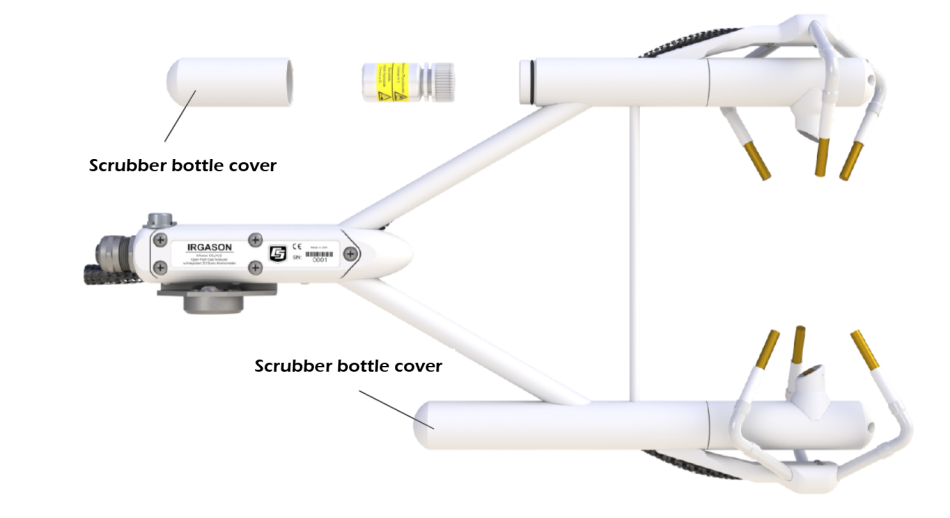A Safer Solution to Scrub Agents from Campbell Scientific Gas Analyzers
by Ben Conrad | Updated: 06/25/2018 | Comments: 0

If you have an eddy-covariance system, you understand the importance of performing routine maintenance tasks so you can continue to acquire high-quality, consistently reliable data. Some of these maintenance tasks are straightforward, such as making sure that the optics on your gas analyzer are clean and that the transducers on your sonic anemometer are clear of any debris. Unfortunately, there’s another common maintenance task that poses some safety challenges: ensuring that the air inside your gas analyzer is free of CO2 and H2O by using sufficient scrubbing agents.
In the past, you’ve probably scrubbed the internal air of your gas analyzer using bottles that contain chemicals such as magnesium perchlorate and DECARBITE®. If you have ever had to replace these chemicals, you have likely faced some of these challenging issues:
- Concern, or even worry, about the health hazards from contact with the chemicals
- Long wait times for internal air to be scrubbed after changing the chemical bottles
- Short time intervals between when chemicals need to be replaced
- Shipping regulations and the proper disposal of used chemical bottles
- Damage to the gas analyzer from liquid water interacting with the chemical bottles
What is the safer solution for this maintenance task?
At Campbell Scientific, we strive to make top-of-the-line instruments that are easy to maintain and safe for both you and the environment. We are pleased to provide you with a safer scrubbing solution. You can now use our patent pending molecular sieve technology to scrub CO2 and H2O from the internal airspace of all our gas analyzers. The new molecular sieve is a drop-in replacement for our old chemical bottles that were used in the EC150, IRGASON, and EC155 gas analyzers.
How can you benefit from this new solution?
With the new, safer molecular sieve bottles, you can expect several benefits.
Innovative technology and improved safety
Recently, we replaced all the internal chemicals in the gas analyzers we manufacture with a 13X zeolite molecular sieve. This molecular sieve is a material with small pores that blocks the passage of large particles such as water vapor and CO2. This design ensures that the air in the internal housing of the gas analyzers is free of those gases. With this patented technology, we are the sole provider of NDIR (non-dispersive mid-infrared) CO2 and H2O gas analyzers that utilize scrubbing agents—without the use of restricted caustic chemicals.
Reliable scrubbing
Tests of the scrubbing ability of the molecular sieve show comparable results to those of the previous magnesium perchlorate/DECARBITE® scrubber chemical bottles. The typical scrubbing time for CO2 is less than a few hours, whereas water vapor is typically removed within a day.
Long-lasting solution
Under normal use, you should only have to replace the molecular sieve approximately once every two years. (If the zero-and-span readings have drifted excessively, you will need to replace the sieve sooner.) The replacement bottles are part number 32897 for the IRGASON and EC150, and part number 33384 for the EC155.
Easy maintenance
It is a quick and easy process to replace the molecular sieve within your Campbell Scientific gas analyzer. The molecular sieve material for the gas analyzers comes pre-packaged in a ready-to-use bottle that can be transferred directly into your instrument. You don’t have to worry about pouring, measuring, or spilling the material. In addition, because of the discontinuation of restricted chemicals, you don’t have to worry about shipping regulations and not being able to acquire the needed chemical bottles for the task.
No risk to the gas analyzer
With the previous chemicals that were used to scrub CO2 and H2O, there was a risk of damaging the analyzer housing if liquid water contacted and reacted with the chemical bottles. This could happen if there was a leak that formed in the housing or if the bottle covers were not tightened properly. The result was—at the very least—an expensive repair along with a risk of exposure to the caustic chemicals when handling the instrument. With the addition of the molecular sieve, these risks have been eliminated.
More Information
The quality and reliability of your measurements can be influenced by the measures you take to maintain your eddy-covariance system. We hope that the added benefits of the molecular sieve over traditional scrubbing chemicals make the maintenance task of changing scrubbing bottles both safer and easier for you.
|
Recommended for You: Review the "Molecular Sieve CO2 and H2O Scrubbing Solution" technical paper. |
To order the new molecular sieve bottles, please contact Campbell Scientific, Inc., at 435.227.9090. Request part number 32897 for the IRGASON or EC150, and part number 33384 for the EC155. For more information, please contact a member of our support team at 435.227.9100.
















 Dr. Ben Conrad is the Director of Micrometeorology at Campbell Scientific, Inc. His background is mainly in ecohydrology/ecophysiology with an emphasis on plant water use in arid environments. Ben has more than 13 years of experience working with eddy-covariance systems and Campbell Scientific data loggers. He holds a doctoral degree in biology from the University of Nevada, Las Vegas. Ben also enjoys spending time with family, playing Frisbee with his dog, and watching songbirds.
Dr. Ben Conrad is the Director of Micrometeorology at Campbell Scientific, Inc. His background is mainly in ecohydrology/ecophysiology with an emphasis on plant water use in arid environments. Ben has more than 13 years of experience working with eddy-covariance systems and Campbell Scientific data loggers. He holds a doctoral degree in biology from the University of Nevada, Las Vegas. Ben also enjoys spending time with family, playing Frisbee with his dog, and watching songbirds.
Comments
Please log in or register to comment.